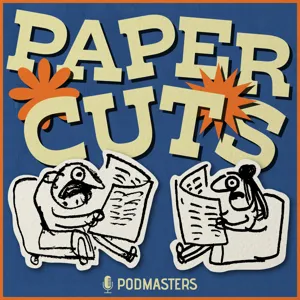Podcast Summary
Challenges in luxury goods industry and geopolitical tensions: Counterfeiters pose threats to luxury brands, while declining alcohol consumption in younger generations concerns wine producers. Geopolitical tensions continue to escalate between Israel and Hamas, with Netanyahu facing pressures from various fronts and the recent attack on the Iranian consulate adding complexity to the situation.
The world is witnessing significant changes in various industries and geopolitical landscapes. In the realm of luxury goods, counterfeiters are becoming increasingly sophisticated, posing challenges for authentic brands and industries. In the wine sector, declining alcohol consumption among younger generations is causing concerns for producers in France and elsewhere. Meanwhile, the ongoing conflict in Gaza between Israel and Hamas continues to escalate, with significant international and domestic pressure mounting on Israeli Prime Minister Benjamin Netanyahu. Amidst these challenges, Netanyahu faces numerous pressures from different fronts, including the need to release hostages, destroy Hamas, maintain his coalition, and navigate tensions with the United States. The recent strike on the Iranian consulate in Damascus adds another layer of complexity to an already volatile situation. While the motivations behind the attack remain unclear, it underscores the larger geopolitical tensions and instability in the region.
Israel-Hamas conflict: Iran's role and humanitarian concerns: The Israel-Hamas conflict involves Iran's support for Hamas and humanitarian concerns in Gaza, with recent events in Syria highlighting the broader geopolitical context and potential dangers.
The ongoing conflict between Israel and Hamas in Gaza is not just about Hamas, but also about its ultimate backer, Iran. The recent Israeli airstrike in Syria serves as a reminder of the broader geopolitical context of the war and the potential danger of Iran's involvement. At the same time, there are ongoing humanitarian concerns in Gaza, with the threat of famine and the recent killing of aid workers adding to the pressure on Israel to change its tactics. Netanyahu's actions could be seen as an attempt to expose the contradictions and potential escalation of the conflict, with the support of the United States being a constant factor. The situation is complex, with both the threat of Iran's involvement and the humanitarian crisis in Gaza playing significant roles.
Navigating Political Tensions in Israel: Prime Minister Netanyahu faces a challenging political landscape due to internal and external pressures, making his replacement a risky proposition. The ongoing conflict with Hamas in Gaza adds uncertainty to Israel's future stability.
Israeli Prime Minister Benjamin Netanyahu finds himself in a delicate political position as he tries to navigate complex tensions within his country and with external forces. The ongoing conflict with Hamas in Gaza, which has led to a state of chaos and contradiction, paradoxically serves Netanyahu by making the job of replacing him even more perilous. However, this situation also creates a heightened danger for Israel, as there is no clear plan for what will happen when the IDF finish their operations in Gaza. A sense of order and governance is necessary to prevent Hamas from returning and to potentially pave the way for peace plans in the future. The lack of resolution to these issues in the midst of chaos and contradiction poses a significant challenge for Israel's future stability.
The Luxury Handbag Market: A Market for Lemons: The rise of the resale market for luxury handbags has led to an increase in sophisticated counterfeit goods, or 'superfakes'. Economists use the concept of 'The Market for Lemons' to explain the risks for buyers in this market, highlighting the importance of transparency and trust.
The market for luxury goods, specifically handbags, has seen a significant shift in recent years due to increased demand and technological advancements. This has led to an explosion in the resale market, which in turn has given rise to highly sophisticated counterfeit goods, or "superfakes." These superfakes are so convincing that they can be difficult to distinguish from the real thing, making it risky for consumers to purchase secondhand luxury bags. Economists are increasingly interested in this phenomenon as it presents a classic market problem: information asymmetry. In George Akerlof's seminal 1970 paper, "The Market for Lemons," he outlined a model of a used car market where sellers know more about the quality of the goods they're selling than the buyers do. This concept can be applied to the luxury handbag market, where buyers risk purchasing a "lemon" or a counterfeit bag. The parallels are striking, with both markets relying on trust and the ability to accurately assess quality. Akerlof's paper, which earned him a Nobel Prize in 2001, highlighted the importance of transparency and trust in markets. In the context of the luxury handbag market, this means that consumers need reliable ways to authenticate goods and sellers need to be honest about the condition and authenticity of the items they're selling. As the market for secondhand luxury goods continues to grow, addressing these challenges will be crucial for ensuring a level playing field for all participants.
Gresham's Law and Secondhand Markets: Gresham's Law can lead to unfair prices and potential market collapse in secondhand markets due to information asymmetry. Intermediaries can help mitigate this issue, but even professionals may struggle to authenticate items, making it crucial for buyers to be cautious and vigilant.
The presence of "lemons" or low-quality items in markets, such as used cars or secondhand luxury handbags, can lead to information asymmetry between buyers and sellers, resulting in unfair prices and potential market collapse. This is known as Gresham's Law, where bad goods drive out good ones when they trade at the same value. However, intermediaries, like mechanics or dealers, who can assess quality and provide guarantees, can help mitigate this issue. Unfortunately, recent cases, like the one involving Chanel and a vintage store, have shown that even professionals may struggle to authenticate items, creating doubt and uncertainty among buyers. As a result, it's crucial for buyers to be cautious and vigilant when purchasing secondhand goods, especially in markets with a high prevalence of counterfeits.
Market for secondhand luxury goods could collapse due to authenticity concerns: The market for secondhand luxury goods, particularly handbags, could collapse due to the difficulty in verifying authenticity and quality, impacting vintage stores, resellers, and brands.
The market for secondhand luxury goods, specifically handbags, could collapse due to the inability to prove authenticity and quality, according to Akerlof's market for lemons theory. This would negatively impact vintage stores, resellers, and even the brands themselves, as consumers rely on the resale market to offset the high cost of luxury goods. In the case of wine, the French, once the world's biggest producers and consumers, are drinking less due to changing trends towards beer and health-conscious choices. The supermarket prices for wine are cheaper than ever, yet the sales of beer now account for half of all alcohol bought in supermarkets. These shifts in consumer habits could lead to significant changes in industries that have long relied on these traditions.
Younger French generations drink less, impacting wine industry: Younger generations drink less wine and alcohol, causing a decline in demand for cheaper wines and challenges for French farmers and rural landscapes, but opportunities for adaptation and innovation in the high-end market.
The drinking habits of younger generations in France are significantly different from those of older generations, with a larger percentage of the under-30 population reporting that they don't drink wine or alcohol at all. This trend, which has led to a decline in demand for cheaper wines, has had wide-ranging impacts on France's wine industry. The government has even had to step in to buy excess low-end wine that producers couldn't sell. While less drinking is good for individual health, it's not great news for French farmers or the rural landscapes that rely on wine production. The industry still thrives in the high-end market, but the cheaper end is struggling. This shift in drinking habits is reflected in the national lexicon, with the popularity of the "Dry January" movement and phrases like "deux" (meaning "two," as in "drink two glasses of water") in marketing campaigns. Overall, this trend presents challenges for France's wine industry, but also opportunities for adaptation and innovation.





![Vaccine Wars [S3, E16]](https://www.podcastworld.io/podcast-images/altamar-navigating-the-high-seas-of-global-politics-165qq56w.webp)
